#loz writes a meta
Text
Endless things to say about these two...

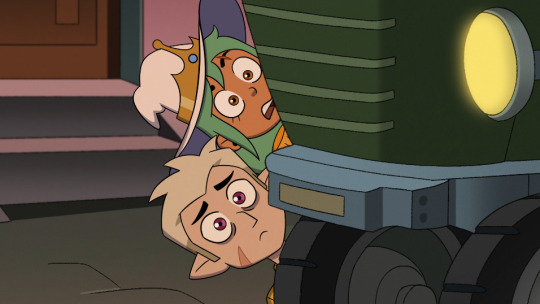

Luz means "light", while Hunter was named by Belos in accordance with witch hunters:
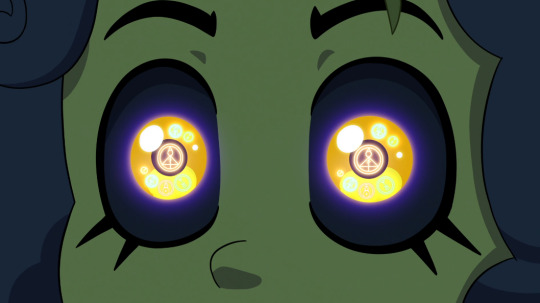
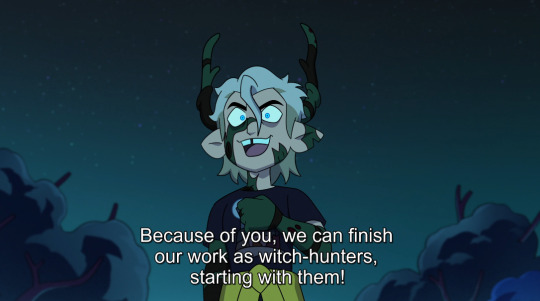
Their encounters with one another in Hunting Palismen and Hollow Mind would set future events in motion:
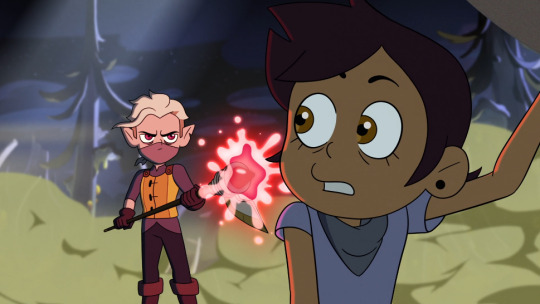
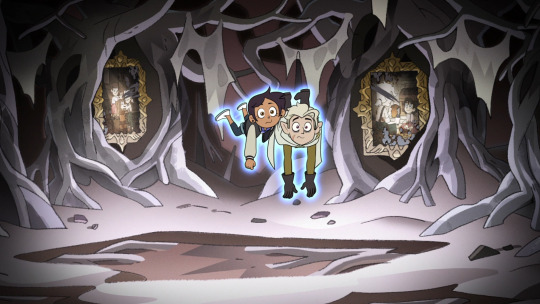
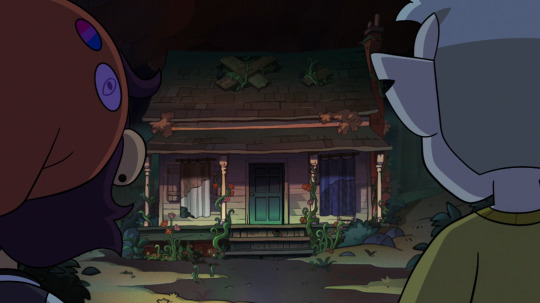
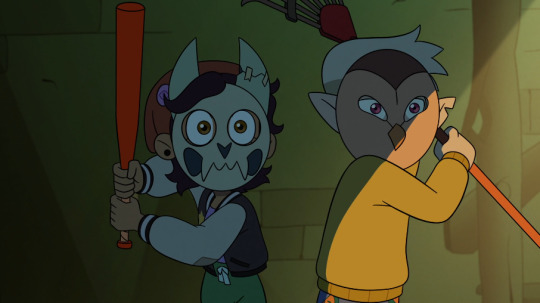
and also led up to Luz telling him "You're family now":

What happened in Thanks to Them reflects the Hollow Mind paintings shown below:
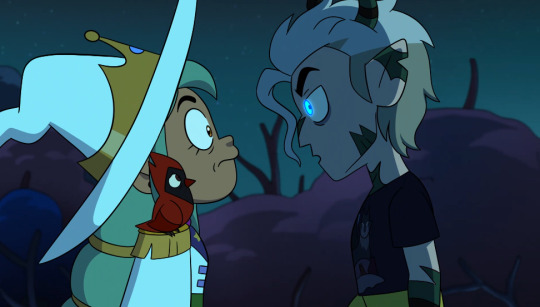


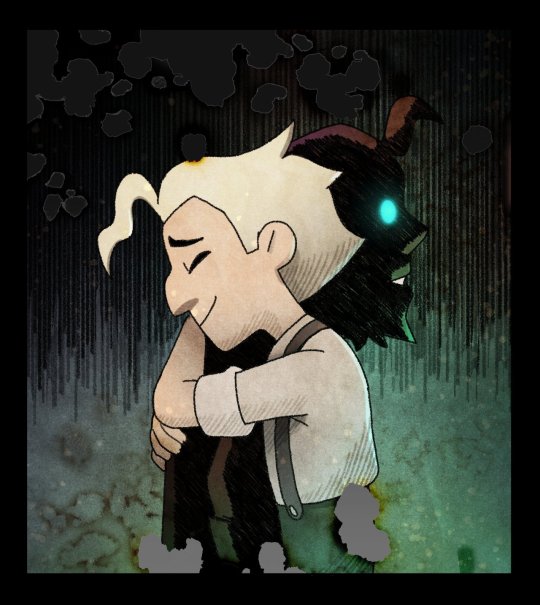
Belos took both of their lives, and we hear a contrast between Luz saying "I feel like I should be used to this by now, but...I still don't know what to say" and Hunter expressing the desires which he never dared to express in Belos's throne room, since the Titan had yet to pass the wisdom of choosing oneself to Luz:


They were pulled out of the water in which they were sinking, by the parent of their adoptive sibling (who also cared about them deeply):
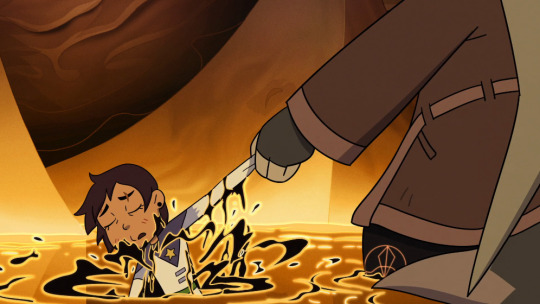
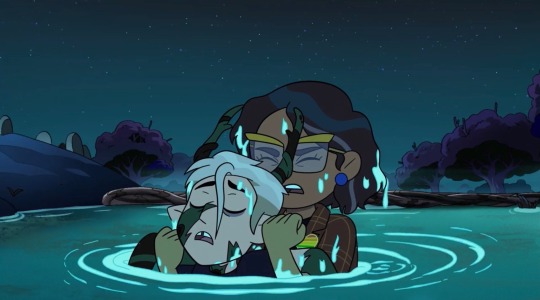
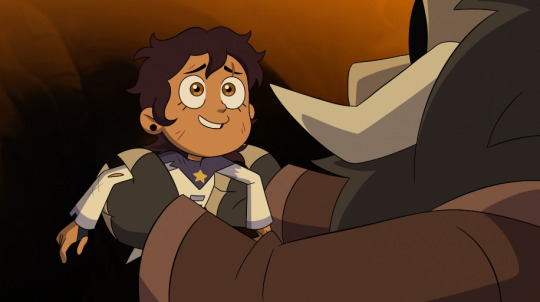

The loved ones who revived them, passed them the last of their strength in order for these kids to have new life:
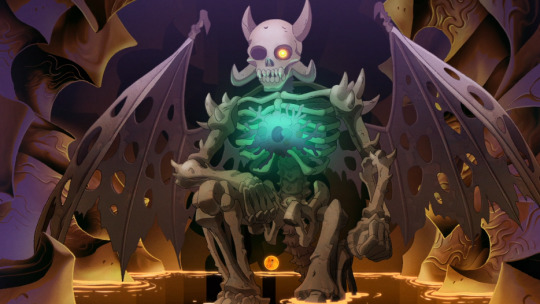

And King's dad asked Luz to choose whether she'd receive his life force which he offered, while Belos coercively violated Hunter to use his body like he would a puppet.
The things that Luz and Hunter went through, in parallel, underscore the clash between Belos who told endless lies about the Titan's will, and the Titan himself - King's father - who had very different plans for the Isles. Caught in between:

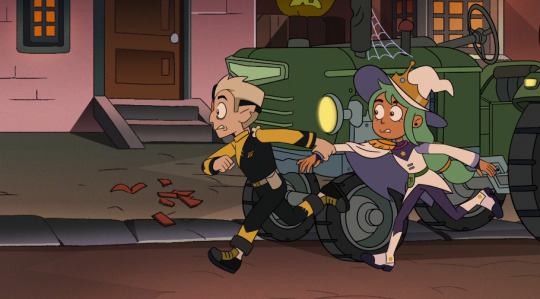
They were put through so much.

(The big comparison post I made before thinking of this analysis - it's just a picset and not a meta/analysis - is here: link)
#toh spoilers#luz noceda#toh hunter#the owl house#king's dad#camila noceda#toh flapjack#wittebane brothers#emperor belos#titan luz#possessed hunter#luz and hunter are siblings#toh analysis#loz writes a meta
3K notes
·
View notes
Text
‼️ totk spoilers ahead (post-crisis at hyrule castle quest and tears of the dragon)‼️
so like of course link doesn't actually fall for any of the fake zelda bullshit that ganondorf and the yiga clan try and pull off right? their impressions of her are terrible and he knows its not her of course
so why do they think he fell for it? why does ganondorf believe he's lead link right into his trap with his poorly designed puppet? i think it's more than just link humoring them, there is something in his expression that makes them think he's so gullible
i think it's desperation.
link knows its not her -- of course it's not! her voice is all wrong, her expressions, even her general aura. he's spent the last probably 5 years never leaving her side, he could pick his zelda out of a thousand perfect imitations every time, but. he thinks he'll never see her again. even before watching the flashback where she commits the forbidden act of losing yourself forever, he feels it in his bones. his zelda is gone.
so when he hears that she's been captured by the yiga clan near dueling peaks he goes, because he needs to see her. it doesn't matter that she's not real, he is seeing her with his own eyes and not through a memory and it could be the last. he just looks at not-his-zelda for a moment and looks so desperate. then he heaves a big sigh and sends a few yiga soldiers back to their master.
then he sees her while working with the sages and the first time, maybe twice or three times, he sees her strange clothes and thinks it's actually her and every fiber of his being is screaming run to her but he's rooted to the spot just staring with wide eyes and open mouth because she's turned away from him, she's walking away -- and then at the peak of death mountain she disappears into the volcano and a beast is released in her wake and he knows its not his zelda after all. and yet every time she appears after that he feels his heart clench and his breath catch and he just takes her in and he doesn't care if it's not real because any time he sees her could be the last.
so link chases chirps and warbles across hyrule because sure, armor that will allow him to climb up cliffs in the rain sounds great and all, but perhaps one of these rumors will come with a glimpse at his lost princess and that is the force that drives him. he chases her like a high and briefly he considers his health because he actually gets an adrenaline rush every time he hears her name and its maybe not the healthiest thing to be perpetuating but he doesn't care, he'll put himself in danger over and over again if it means seeing her golden hair and emerald eyes just one more time.
when purah points him to the castle link doesn't wait for her to finish, just sprints to the tower and launches himself into the air so he may catch her once again. when he gets there he hears a voice that sounds like his princess but the tone is all wrong of course, he knows. he chases her through the castle and cuts through the enemies she leaves for him every time. in the sanctum, ganondorf mocks link for being so foolish, for falling for his puppet so easily and being led right to his trap. the demon king misreads the expression on his face as disbelief, and link doesn't correct him. he doesn't say that of fucking course he knows its not his zelda, it was a weaker imitation than fucking beedle could do. he doesn't say that he's been chasing a puppet because he's desperate to see her just one more time, and maybe there is a small part of him that hopes that this time might be the one where she stays, where she looks at him with the same desperation and hugs him and tells him she's home.
when she disappears that time it's for good, and he waits until the sages leave before breaking down.
#I've been in the shower for like 45 minutes writing this#i haven't written tumblr meta in years but I'm so gone for totk link and his inner monologue#zelink#tears of the kingdom#totk#totk spoilers#tears of the kingdom spoilers#loz#botw#breath of the wild#this is pure word vomit and probably makes no sense but i just had to get it out
269 notes
·
View notes
Text
We as a fandom need to discuss more the differences between the Zeldas across the games cause they are fascinating.
Take Ocarina of Time.
Sheik in Oot is very emotional un-available and distant, to the point of coming across as overtly dutiful. Sheik in oot shows up to teach Link songs then ding dong ditches immediately. The one time they had a heart-to-heart after water temple Sheik Cannot Handle and bolts to watch Link from afar cause he cannot having an emotional connection when he's already traumatized from his previous actions as kid leading to the destruction of Hyrule and feels guilt over his actions in what essentially was ruining Link's life.
And that emotional unavailability continues when Sheik is Zelda cause after everything is said and done instead of actually unpacking everything that just happened Zelda justs - sends Link away. She sends him back to the past cause that guilt is so strong that she feels the only way to atone is to have him relive those years to "fix" the problem. Never occurs to her to actually open up to him. To pour out these feelings and this guilt. That they can move on this way. It's part of the tragedy of Ocarina of Time imho. And an interesting contrast to botw, where there is tragedy, the story ends (in totk) with Zelda and Link moving on and building on that new future.
106 notes
·
View notes
Text
Oh my poor little Blorbo, oh the horrors of beings an angst writer's little Blorbo. All that love and it gets you tortured. Who could do such a thing (me)
#touya todoroki#vaati the wind mage#dabi#bnha dabi#mha dabi#loz vaati#legend of zelda vaati#vaati#blorbo#meta#writing#self awareness
7 notes
·
View notes
Text
The part where Marin tries to wake the Wind Fish is probably my favourite part in the entirety of Link's Awakening for how effectively it plays into the overarching themes and message of the story, utilizing Marin's character.
Marin tries to wake the Wind Fish because she believes this might make her wish come true. This is not interpretation, this is text. Earlier in the game, Marin states directly: "They say the 'Balled of the Wind Fish' is a song of awakening. I wonder, if the Wind Fish wakes up, will he make my wish come true?"* We also know what she wished for because of this piece of dialogue during the beach scene: "If I was a sea gull, I would fly as far as I could! I would fly to far away places and sing for many people! ...If I wish to the Wind Fish, I wonder if my dream will come true..." Although Marin refuses to tell us what her wish to the Wind Fish was, this piece of dialogue also makes that abundantly clear. Marin believes that waking the Wind Fish will allow her to fly to many places and sing to many people, like a seagull.
And she is not wrong! If you get the secret ending (obtained by not dying during the game), you see a vision of Marin change into a seagull after the Wind Fish wakes. Marin's attempt at waking the Wind Fish and her repeated assertions that waking the Wind Fish might grant her wish is, in part, clever foreshadowing for this secret ending. This is clearly part of its function.
But another, arguably more important aspect of Marin's attempt to wake the Wind Fish is that it serves as a kind of dramatic irony for the player, regardless of whether they know about the secret ending or have even finished the game: at the point of the game where Marin tries to wake the Wind Fish, you, the player, have already had Koholint's Big Secret revealed to you. Marin, on the other hand, is entirely ignorant. We know that waking the Wind Fish would make Koholint vanish, but Marin doesn't.
An isolated, surface-level reading of the situation is as follows: Marin, in her naiveté, is attempting to accomplish something that would doom her. This reading is, to a certain degree, understandable: Koholint's transient nature, and its inevitable end, is certainly sad. We can wonder whether Marin, knowing the full extent of the consequences, would have still wanted to wake the Wind Fish. That was her home, after all, and while she would like to explore the great wide somewhere, she might have been less eager to if she understood that this is only possible if her home did not exist anymore.
But ultimately, this reading is shallow and does not engage with the explicit themes present all throughout Link's Awakening. While Koholint's inevitable end is sad, yes, it is also ultimately not a tragedy. The Nightmares in the world have the aim of controlling the dream and, to accomplish it, are prolonging it unnaturally. The only people who ever protest your quest to wake the Wind Fish are those same monsters, the obvious bad guys of the story. In the end, after the Wind Fish has woken up and Koholint has vanished, we leave on a shot of Link watching the Wind Fish fly off, smiling. It is the nature of dreams to end: all throughout the game, this is made abundantly clear, spelled out in the Wind Fish's final speech, and crucially: this is not a bad thing. The bad thing is forcibly prolonging a dream, clinging to it and refusing to move past it, as the Nightmares were doing.
Engaging with the game's themes, the cynical reading holds no water. Koholint's end is no doom; its doom would be existence in perpetuity, especially if ruled by the Nightmares, as would be inevitable (they are the ones keeping the Wind Fish asleep, after all). By attempting to wake the Wind Fish, Marin is not dooming herself. In addition to all of the above, again: there is an ending where she does have her wish come true, if the Wind Fish wakes. She was correct.
So what, then, is the purpose behind this scene? If not the dramatic irony of unwittingly working towards your own doom, what does it want us to take from it?
Marin is an interesting character on Koholint. While its other residents routinely and consistently fail to comprehend even the general idea of a world beyond this island (as shown by dialogue such as "Dude! You're asking me when we started to live on this island? What do you mean by 'when?' Whoa! The concept just makes my head hurt!" by the children in Mabe Village), Marin asks questions. She's restless, as evidenced by her frequent visits to the beach, her need to know about the world beyond Koholint, and, of course, her attempt to wake the Wind Fish. Why is Marin capable of these questions, whereas most of the other residents are at best unconcerned with the outside world or, at worst, incapable of even thinking about it?
It is up to interpretation, but I posit: for the same reason the Owl is. More or less, anyway.
The Owl is perhaps the strangest part of the dream, not just more aware than the other residents, but more aware than you, as well. It acts as your guide, purposefully so; it references being 'instructed' to help you ("I was instructed to give you directions... Your next goal is north, in Goponga Swamp!!"). The reason for this becomes clear during the ending sequence, where the Owl reveals: "As part of the Wind Fish's spirit, I am the guardian of his dream world." The Owl has a much more direct connection to the Wind Fish than the other residents, which makes sense; as the dream world's guardian, it would have to be aware of its nature and its mechanics in a way none of the other residents would be.
'As part of the Wind Fish's spirit' is interesting; the most literal way to interpret this is the literal one, where the Owl is a part of the Wind Fish's spirit in a way most everyone else on the island isn't. This is supported by the mural you find in the ancient ruins that tells you Koholint's secret, which depicts the Owl immediately alongside the Wind Fish.
But it is important to note that all of Koholint is a part of the Wind Fish; its dream, if nothing else. While the Owl obviously has a different role and greater connection to the Wind Fish than the other residents, it is not unfair to assume Koholint's residents all reflect parts of the Wind Fish, as dreams often reflect parts of ourselves, as well.
The Wind Fish is being forced into a slumber for much longer than is natural by the Nightmares. Repeatedly, the Owl references the Wind Fish growing restless as you get closer and closer to waking it. Before entering the seventh dungeon, the Owl states, directly: "Go! The Wind Fish grows restless!" Upon exiting the seventh dungeon, you can find Marin on the bridge, after having attempted to wake the Wind Fish.
I say the reason Marin tried to wake the Wind Fish, as a matter of fact, the reason she wanted to leave Koholint at all, is a reflection of the Wind Fish's desires to do the same. Her role in the dream is to reflect the Wind Fish's restlessness; or perhaps, that's a fancy way of saying that this is one of her main thematic purposes in the game.
Marin is Koholint's personification. Not necessarily in-universe, but for the purposes of gameplay. It is harder for the average player to get attached to the whole of an island than it is to get attached to a singular girl, who is opinionated and likeable, with a strong personality and hopes and dreams. Without Marin, Koholint's inevitable fading would have much less emotional impact, as Marin shows us that Koholint's residents are people, and provides a microcosm of the island as a whole for us to get attached to. Marin is, effectively, Koholint's representative to the player.
As such, Marin mirrors Koholint in many ways: sweet but mischievous, a bit weird but lovingly so; her name is literally 'Marin', meaning 'marine' in at least French and probably Spanish (I don't speak Spanish and only a little bit of French) and it's one letter off in English as well. When Marin tells you not to forget her at the end of the game, this is connected to the Wind Fish's declaration at the very end, that Koholint will now only exist in memory. This demand to remember her not just meant to be taken literally; it's also meant to be taken as a declaration by the game to remember Koholint.
As such: Marin's restlessness are intended to be reflective of both Koholint and the Wind Fish. Her desire to leave the island and fly away is the Wind Fish's, and therefore, Koholint's, as Koholint is a part of the Wind Fish. The purpose of having Marin try to wake the Wind Fish is to signal to the player that the island wants to wake up; the island's representative made an attempt, and the Nightmares' monsters punished her for it. She needs you to help rescue her, like you need to rescue the island.
Having Marin attempt to wake the Wind Fish is one of the strongest moments of writing in Link's Awakening, showcasing the story's themes and overarching message in an interesting way that adds a lot of character to Marin as well and I'm very, very normal about it.
*All quoted dialogue in this post is taken from the Link's Awakening DX script on gamefaqs, which I would truly love to hyperlink in this sentence but Tumblr is refusing to let me, so it can be found here: https://gamefaqs.gamespot.com/gbc/197769-the-legend-of-zelda-links-awakening-dx/faqs/38914.
#'oh this'll be a short post it's gonna be a few paragraphs long I'm not writing the big marin meta'#'i can start this post at 11:30 pm and finish before midnight'#sigh. pain and suffering.#loz#marin#marin loz#my posts#long post#this does not actually cover everything i wanted to cover in the Big Marin Meta#but it's fine i can do it in pieces instead of making a singular long essay#also it's rlly scatterbrained due to me not actually intending to cover half the stuff i covered here but it's fiiinnnneeeee#Link's awakening
14 notes
·
View notes
Text
Convincing you to play my favorite games by describing them badly
Final Fantasy XV: Bachelor Party Goes Horribly Wrong
Kingdom Hearts: Lost Island Boy Realizes That Maybe the Real Eucatastrophe Was the Friends We Made Along the Way
Professor Layton: University Professor Avoids Getting Fired by University For Never Teaching His Classes and Going on Too Many Sabbaticals by Repeatedly Winding Up in the Newspaper for his Heroic Exploits
Knights of the Old Republic: Amnesiac Accidentally Joins a Cult...Twice? (I do NOT think the Jedi Order is a cult this is a joke)
The Legend of Zelda: Teenager Cursed by Demonic Deity To Remain Trapped in a Never-Ending Cycle of Pain and Hatred in Which Neither of Them Will Ever Truly Die, Goes Fishing
Portal 2: Being Insulted Has Never Been So Funny
Fire Emblem: Three Houses (Blue Lions Route): University Professor Wakes Up From Coma And Is Forced to Help Former Student Defend Country From Imperial Annexation, Tries to Get Him to Go to Therapy
Journey: I Have Played It Three Times, I Have No Clue What's Going On, But It's Gorgeous
#i always feel like i need to put a disclaimer when i talk about fire emblem because there are sometimes some suggestive themes and other#things i don't like#nothing too blatant but one of those things that makes you pause every once in awhile and go 'oh wait."#but the blue lions route is just so good and i know the mutuals who love to write meta would go absolutely INSANE about the themes of#vengeance and redemption and mercy because I SURE DID#eighteen year old me was not PREPARED#video games#professor layton#it is so hard to describe kotor without spoiling the big twist#kotor#loz
32 notes
·
View notes
Text
BotW/TotK Hylian Royal Family meta ahead.
These are my headcanons based on what I’ve seen from the games. Obviously, everyone has different thoughts on it. No bashing in it and possibly Rhoam-critical but not Zelda-critical. Just headcanons about how the role religion played in Royal Life pre-Calamity.
Also, I’ve barely touched AoC, so this meta is based more on BotW, TotK, OoT, MM, TP, and SS, with the full understanding that this is headcanon and no consistent canon on this matter exists and will never exist... not even between BotW and its direct sequel, TotK.
A major plot point in BotW is Zelda’s inability to connect with her powers. There is no indication that she can do the things Link takes for granted in BotW, like see the Koroks and dragons. I would be surprised if she could. She’s young, frustrated, and her father -- her only living parent -- is pressuring the hell out of her to connect with her powers. It’s clear in the flashback and in his journals that he isn’t acting like a parent and he’s aware of it. He’s acting like a king who knows that he needs a specific weapon and is given a rough rulebook on how to access the weapon. Per their history, Zelda has Goddess blood which gives her access to a weapon which can defeat this grand evil; her ancestor was able to activate it, so obviously Zelda should be able to do the same; Zelda is failing to activate the weapon which should be automatic to her per some ancient rulebooks. It’s unknown how detailed the guidelines for activating this power is or the King is just assuming that of course this is what Zelda needs to do to activate this power. I mean, it was 10k years ago (which seems insane to me, but whatever).
Here’s where more headcanons come into play. I think the power of the Goddess -- and honestly, pretty much everything spiritual -- is completely disconnected from the Royal Family in this era. Per their records, the last time the holy power was needed was a long time ago. I would be shocked if something else hadn’t happened in the meantime (seriously, it’s one hell of a time difference), but for them, the power of the Goddess Blood hasn’t been needed any time recently. Zelda has made it clear that she has no personal connection to it. Her drive is scientific. She has no internal motivation to be connected to the Goddesses. Her motivation to connect to her powers isn’t because she wants to connect to anything on a spiritual level. She wants the power to protect her people and, honestly, because she’s experiencing so much pressure and backlash. Again, per BotW (and TotK, really), we don’t see her do any of the spiritual/divine/extra stuff Link does. Link talks to multiple divine statues. He plays games with the Koroks. In the BotW flashbacks, she is happiest when she’s doing Science(!), and in TotK, she focuses on highly practical things with no stories (that I’ve seen so far) of her doing anything with a spiritual slant. Her focus is rebuilding a school, not rebuilding a church.
It makes sense, though! I think the Goddess Blood and its associated power is more academic than anything. They know Zelda has it. Hell, the Hylian Royal Family relies on that Bloodline to claim their divine right to rule. They know that the power of the Goddess was used by previous princesses to protect the family. With all that said, there is no indication in canon that it has any modern role in their lives. Hell, there is no indication that spirituality in general has any role in the lives of the Royal Family. It seems like the Goddess Blood has two primary roles pre-Calamity: to ensure Divine Right to Rule and to awaken to protect Hyrule from the Calamity. That’s it.
In at least one previous game, it was said that the Hylians’ ears were shaped that way in order to better hear the spirits and the like. We don’t know Link’s own abilities when it comes to this pre-Calamity. I personally enjoy the headcanon that he could hear and see far more than Zelda but didn’t want to say anything because it would hurt her. Would also match with the concept of “keeping his mouth shut helps keeps his ears open.” But there’s no strong evidence that spirituality or anything play a strong role in Hylian daily life pre-Calamity. It might have been something which was also lost through time. That is a major theme in many Zelda games: that important things, including connection with the divine, have been lost. The Zelda games love showing ancient, forgotten things, things whose stories can never fully be told again. The original stories are long lost, and all that exists in the BotW/TotK are modern interpretations, fairy tales, prophecies, etc. For further examples, see the Zonai Survey Teams and how they are excited about their discoveries but can’t connect to them in the way Link casually does.
I read a story once about how a pastor once invited an enthusiastic member of his congregation to lead a prayer one day. He didn’t ask her beforehand. She was always highly motivated, highly social, and a strong believer. He didn’t think anything of his request. It should have been fine! Instead, she walked up to the front of the congregation, stood there for a moment, burst into tears, and fled. Later, he discovered that while she was very religious, she was never taught how to pray. Prayer was a major part of their religion, and as such, it was expected that everyone automatically knew how to do it! Not so! He realized an important lesson that day and didn’t take it for granted again.
Prophecy and Divinity play a significant role in the Royal Family, but do they actually know what to do with it? Zelda is told to pray and she’s told to do it for a specific reason: unlock her powers so she can help defeat the Calamity. We never see the King pray or do anything religious at all. He obviously believes in the prophecies and such but doesn’t actively do anything himself: Hylia favors their family, Zelda has Goddess Blood, etc. etc. etc. Very matter-of-fact things. Nothing he needs to do, actually! Because according to the Prophecies, he just needs to make sure the players are in place! Actual knowledge and practice doesn’t come into play here. No actual internal spiritual beliefs: just practical applications.
So that’s my headcanon as to one of the reasons why Zelda struggled. Would knowing how to pray have helped in the end? Unknown. When her power eventually arose, she was still pretty disconnected from it. It seemed like in BotW and TotK that she never fully connected with it: just used it to fulfill her goal, which was stopping the Calamity from destroying her people. Maybe her daughter or granddaughter or whoever would connect with their spiritual heritage. Overall, King Rhoam, who had probably never really prayed a day in his life and had no real connection to Hylia himself, looked at his daughter, told her that the only way to awaken her powers was to pray, and never thought for a moment that if he didn’t know how to pray, how the fuck should she?
#meta#botw#totk#loz#not zelda bashing#i love me some scientist zelda#but really#she didn't want to pray#she wanted to see what happened#if link licked a frog#she would barely blink at a church#but would go nuts#over historical ruins#no idea if this makes sense#or if it is just rambling#but still#also makes me want to write#yet MORE AUs#sigh
26 notes
·
View notes
Text
something about the narrative of the legend of zelda man. link is a reincarnated soul always chasing after the people he needs to save. theres so many different iterations of what is fundamentally the same person. he can only be a hero. no one ever actually gets to know him. hes always forced into fulfilling destiny. he can never go back to any of his families because his destiny as a hero always changes him too much in their eyes for things to ever be the same. he fights as hard as he does just because someone needs his help. so many people care about him but never get to see him again after his destiny is fulfilled. he always disappears. the hero of time always arrives too late. how many times has he done this already
#i so desperately wish that one loz game just had like a nasu style writing storyline#link#legend of zelda#zerav meta#girl help hes the ORIGINAL hero trapped by the narrative
116 notes
·
View notes
Note
Give us the oot tea sis 👀
-Sky Floor
Hokay, I have my computer glasses, I took my sweater off, the fan is on, and my fingers don't hurt (too much :P), so let's go! (TL;DR at the bottom)
I started puzzling this out when I was trying to figure out what kind of story I was experiencing while playing. It's something I've been able to do for every Zelda game I've played: for Skyward Sword, Link is determined and loving, but has to temper and better himself over the course of the story in order to save the girl her loves. In Breath of the Wild, Link is picking up the broken pieces of a world he does not remember, discovering it and rediscovering it at the same time.
Link's story in Ocarina of Time is about loss and growing up. But it's a lot more complicated than simply, "he was a child but then he had his childhood ripped from him so he had to grow up too fast". How is it evidenced in the narrative? What kind of themes enhance this idea? How do the other characters and their positions and arcs support this main theme?
And then I got it. Every character in Ocarina of Time is defined by two things: The role they have to play, and their awareness of how this role affects them and other people. My experience in the game was loneliness and the constant feeling of the walls closing in. Link's story is that everyone in his life on whom he needs to depend is barred from understanding him, listening to him, and giving him the support he needs.
Of course, this is evidenced best by the various characters and the changes they undergo during the timeskip of seven years.
Saria, very plainly, represents Link's childhood innocence. She is his only friend that understands what his childhood was like and, and what it meant to him to be ostracized and bullied for not having a fairy, and what it would mean for him to leave her behind. She waits for him in a way that no one else does after seven years. She wants to see him again and make sure he's okay. Again, she thinks of him in a way that no other character seems to do. But this sweet friendship is stolen when she awakens as a Sage and says this:
"I always believed that you would come. Because I know you... No... You don't have to explain it to me... Because it is destiny that you and I can't live in the same world."
Destiny separates them. The divine role they have to play cuts Link off from his oldest and best friend.
Darunia, the Goron chief, welcomes Link with open arms after he defeats King Dodongo. He makes him his Sworn Brother and enthusiastically sees him on his way as a friend. Seven years later, Darunia recognizes him as an adult, but there is no time for them to catch up. Darunia's people are captured and dying, and the duty he has to his people brings him to ask Link to aid him in saving them. Once their victory is won, Darunia is now a Sage, and says this:
"You turned out to be a real man, just as I thought you would! By the way, I, the wild Darunia, turned out to be the great Sage of Fire... Isn't that funny, Brother? Well, this must be what they call destiny. Nothing has made me happier than helping you seal the evil here! Hey, Brother, take this! This is a Medallion that contains the power of the fire spirits--and my friendship."
Though Darunia expresses his pride in Link, he cannot support him any further. Destiny comes between them.
Ruto, the Princess of the Zora, makes Link a heated promise in her childlike adoration of him. Seven years later, she fully believes in his return for her (despite Link prooooobably not knowing what Marriage was at the time😬). She views her love for him as the valuable gift it is, but again, is debarred from letting her affections blossom by the necessity of their partnership in the fight against evil. And she recognizes the duty they both hold in this battle, saying:
"As a reward...I grant my eternal love to you. Well, that's what I want to say, but I don't think I can offer that now. I have to guard the Water Temple as the Sage of Water..."
Again, destiny comes between Link and a person who would love him. (Quick note: did Ruto actually consider Link's feelings? No. Does it look like she was capable of doing so, after seven years? I would say yes.)
Impa doesn't have as much to do with this, but I can't exactly skip her, can I? Devoted to her charge, Impa is dedicated to protecting the princess. After she awakens as a Sage, she commends Link for his courage and maturity, and asks him to protect Zelda in her stead.
"Now I see that you have become a fine hero... There's nothing to worry about... The Princess is safe now. Soon, you'll meet Princess Zelda face-to-face, and she will explain everything... That is when we, the six Wise Ones, will seal up the Evil King and return peace to Hyrule. I have to stay here... You go to Princess Zelda's side and protect her on my behalf."
Link takes on the responsibilities of an adult, which destiny placed on his shoulders.
The Gerudo leader, Sage of Spirit Nabooru breaks the mold. From her first introduction, she has no relation to destiny or a divine role, and in fact demonstrates her willingness to reject those who wish to make her do their will. To her, Link is not a beloved friend, or an awesome hero, or an adored ideal, or a light in the darkness. He is just a child who can aid her. It is incredibly significant to me that the only dialogue options in the entire game where Link can respond in more than "yes" and "no" are in his conversation with Nabooru.
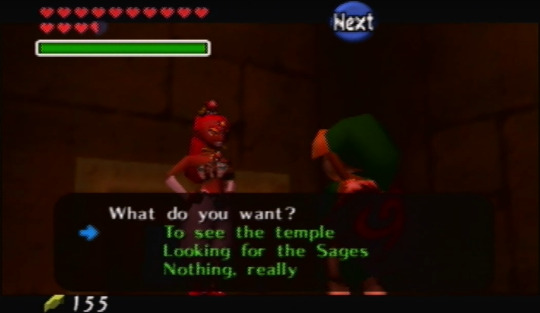
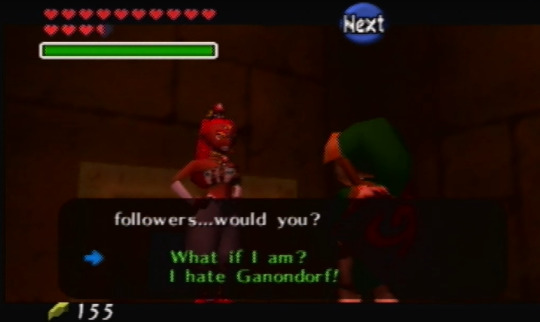
(Footage from Arglefumph: The Nancy Drew Dude on Youtube)
What's this? The first opinion Link has ever expressed in this entire game??? Link from Breath of the Wild had a condition where the pressure and expectations on him made him unable to speak or emote, and I can't help feeling like the same might be true for the Hero of Time.
Anyway Nabooru also breaks the pattern by not encountering Link in the early stages of the game. When you get to the Spirit Temple portion of the game, Link travels back in time to meet her and then immediately goes back to the future (hehe) to continue her quest. When Nabooru meets him again in the future, he has freed her from the Twinrova's control and made it possible for her to awaken as a Sage, upon which she says this:
".......But isn't it funny? That a person like me could turn out to be the Sage of Spirit! And now, I'm going to fight them as one of the six Sages! Heh heh... I'm going to pay them back for what they did to me!"
Although Nabooru fits into her divine role more naturally than the other Sages, her destiny still divides her from the physical reality.
These are the Sages, the people aware of the turbulent destinies laid upon them and the divine duties they must shoulder. But the reactions of the other residents of Hyrule show a concerning trend: all of them see Link as only a portion of himself. To most townspeople, he's just a random kid all up in their business. To Mido, he's his rival for Saria's attention, and later, the kid that he failed. To Malon, he's the boy whose memory she holds dear, the man who had the courage to drive the evil out of her home. Some see a savior, some see a customer, some see a young man to run their errands, but they all see the image of the person they want to see. A mask, if you will.
And all of this comes to a head in Zelda/Sheik. Before the seven year timeskip, Princess Zelda is effectively Link's boss. She directs him to do what she cannot, in a desperate plan to take matters into her own hands when the adults refuse to listen. Sheik watches over him, inexplicably appearing and disappearing, always out of his reach.
The progressing relationship between Link and Sheik is something I'd like to detail. The first two temples, Link plays along. He follows Sheik's instructions and listens to his guidance. Every time he turns his back, Sheik vanishes. What really stuck with me in the encounters with Sheik was how they're the only person Link really knows is following with him. The only person who knows—understands—what he's going through, who chooses to reach out consistently and hand him the tools he needs. Link is so, indescribably, lonely.
In Lake Hylia after the Water Temple, when Sheik readies to vanish again, Link runs toward them. Link so rarely emotes in this game, which makes every stumble, every motion significant. In the encounter immediately after this, Link and Sheik partner in battle. They stand as equals for one cutscene—and that's all Link wants, really. To be on an even playing field with another person, not planner and executor, not childhood friend and adult, not a pawn in whatever game the one he's facing wants to play.
Then he meets Sheik in the Temple of Time, where they reveal themselves to be Zelda, and I'd like to imagine that Link allowed himself to hope. The imminence of destiny, of their divine roles, overshadows their conversation, but perhaps Link thought, for a moment, that his partner in destiny would see him as more than what she needed him to be.
But Zelda dashed these hopes to pieces after their victory over Ganon (Keep in mind that the final boss section is the only part I haven't played yet, although I have seen the cutscene at the end). She recognizes the hardship and loss Link has gone through, and blames her own choice to drag him into the uncaring saga of fate and destiny. Too blinded by guilt to recognize what he truly needs, she strips him of the relational connection he so desperately needed—and takes even more from him: the skill he had worked for, the future he earned, and every memoried record of his pain and struggle. In Zelda's misguided attempt to shoulder Link's responsibility, she sent him to the past with the mission to shoulder hers.
"All the tragedy that has befallen Hyrule was my doing... I was so young...I could not comprehend the consequences of trying to control the Sacred Realm. I dragged you into it, too. Now it is time for me to make up for my mistakes..."
And finally, we all know about Navi. (Honestly, I forgot about her for most of the game. All she does is prompt me towards the next dungeon and remind me that I cannot, in fact, open doors that are locked.) Well, I mean, about her mysterious departure. After Link is sent to the past, to the moment before he pulled the Master Sword, Navi up and drifts out the window like her wings turned into dandelion fluff.
This is the last blow, salt in the wound, if you will. The last entity who at least knew about Link's journey, however unhelpful and silent she may be, abandons him with no explanation. Aside, she is Link's last link (haha) to the home of his childhood. Without a fairy, he cannot navigate the Lost Woods and return to the Kokiri Forest. This metaphor assures us that Link's childhood innocence is irretrievable, that although he may have traveled to the past, Link himself remains the person he became over his adventure. However, Navi's departure also serves to signify the finality of Link's isolation, and tells us that truly he is now, more than ever, alone.
TL;DR In Ocarina of Time, Link's narrative is that of loneliness and loss, with companionship and support just out of his reach the whole game until it is locked away forever.
Some extra video essay insights on Ocarina of Time: Every Zelda Is The Darkest Zelda by Jacob Geller Ocarina of Time: A Masterclass in Subtext by Good Blood
To confirm: This essay is based on my personal experiences and therefore personal interpretation of the game.
Also: FUCKING THANK YOU NABOORU WHY DID IT TAKE SO LONG FOR SOMEONE TO MENTION THIS /j

#WHOO DONE#oot#ocarina of time#ocarina of time meta#loz#legend of zelda#did i just write a 19+ paragraph essay about a video game? yes yes i did#and im very proud of it too
48 notes
·
View notes
Text
tbh all things considered im at least glad that my discomfort with totk is what really drove me to really discover a lot of the discussion and analysis into the racism and orientalist stuff and... all of that in the zelda series, since i was halfway aware of it in the past but only more recently started to really look into it further and see what others have to say about it
#salty talks#loz#legend of zelda#just been thinkin abt this after seeing a few more posts abt the way the gerudo and ganondorf are typically treated#like... im not exactly new to learning about the nastier parts of something i like and moving to enjoying it while being critical of it#i mean at this point being a warrior cats fan is the same as being a warrior cats hater#but since warrior cats' issues is more about the misogyny and ableism that was has always been a bit easier for me to pick up on n stuff#while the racism and like in loz is a bit harder (as a white fan of the series) so im just. glad? that theres a lot out there about these#aspects and im trying to better understand the issues with all of this and why its all bad and stuff#like esp with movie worries and my own writing of the ganonbeck fic wherein ive tweaked some gerudo stuff#like. idk if it was a good move to tweak it so that gerudo males are just very rare rather than 1 per century#like rn i plan on them running into another male gerudo in chapter 2 among some other gerudo to make good on that#and like idk if thats a good tweak to the lore or anything while sticking to most of the shit canon has to offer#idk im just glad that im now more actively learning about this stuff and all of that even if ive maybe been a bit tactless in some tag rant#idk what the point of this is ig im just having a little reflection moment abt whats changed in my knowledge of the series' meta elements#since totk crash landed in my general vicinity
4 notes
·
View notes
Text
There hasn't been any interaction between Raeda and Hunter except pretty minor moments:
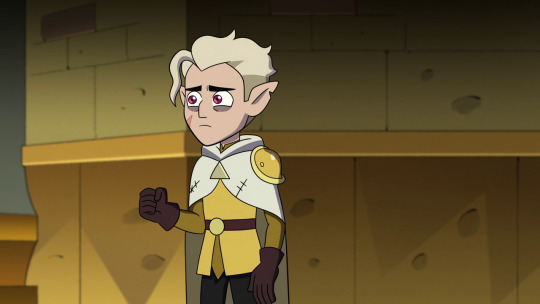
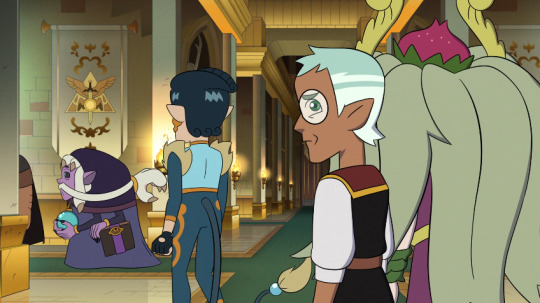

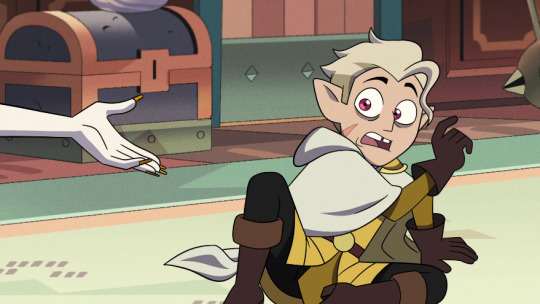
But man oh man is there common ground now:
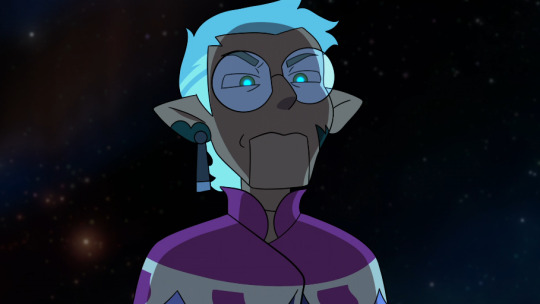
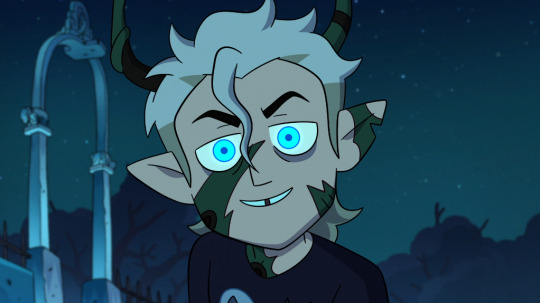


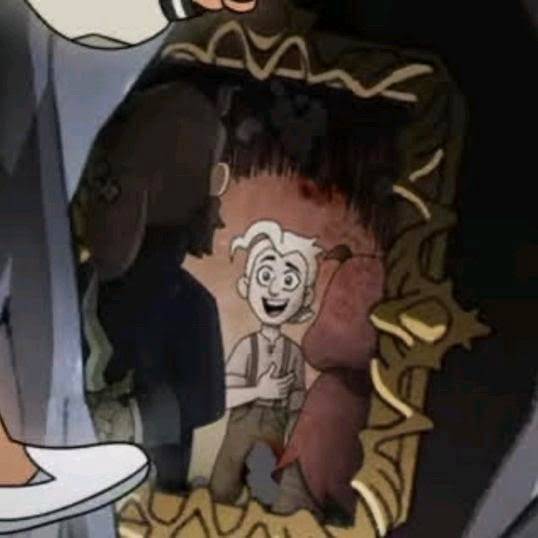
I have no clue if they'll do it but it would be really rad if Eda and Hunter stand side by side in front of Philip in Watching and Dreaming, to tell him it's all over.
I want Raeda to adopt himmmm...but it's probs not happenin'..
#the owl house#raeda#eda clawthorne#raine whispers#toh hunter#caleb wittebane#evelyn clawthorne#possessed hunter#possessed raine#toh analysis#toh spoilers#1k#2k#loz writes a meta
3K notes
·
View notes
Text
i am on tumblr instead of writing and i was writing instead of reading abt the company im going to interview w later
#todays writing endeavor! breaking and entering!#so some zelda meta! ive been reading the wiki and watching lets plays and shit and wow this girl just can't win!#(like ostensibly shes a different girl more often than the same girl from game to game#but my point is tp oot and botw/totk zeldas have it fucken ruff and make bad choices (which are the only options they have))#and you know i love a fail woman#so the dynamic that's developing is link being everybody's weird friend who can solve their problems#and zelda being kind of an outsider#loz posting#gripes and tripes
2 notes
·
View notes
Text
Compilation of 'Vincent's Graffiti' in Shinra Manor Basement
He knows of the Remnants of Sephiroth already...??
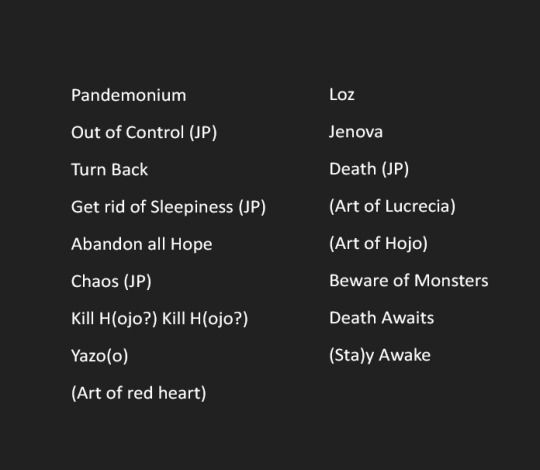
I managed to compile all of the contents in the cave as best as I could, Japanese, English, and images. While much of this isn't new per se, I did come across something that I've seen rumored, but never saw any images to prove the statement... that is till I did some digging myself. It had been rumored that the names of some of the Remnants had been written on the walls. Turns out, the rumor is true. What makes this very intriguing is that this supposedly written by Vincent.
The names Loz, Yazo(o), and Jenova appear mixed with some complex mathematical equation.



Granted, this could have been written by either Lucrecia or Hojo, but it wouldn't make sense for them to scribble scientific data on a cave wall as opposed to archivable science media. And given the vibe of the other words and images, one can only assume this was written by Vincent himself. Perhaps it was done after his initial state of mental turmoil, once he was able to regain control over himself, but that's all highly speculatory.
What is interesting to note is that Vincent in Advent Children was 'well informed' about the Remnants, according to Cloud. How Vincent had this prior knowledge, we are not told. But to see Loz, Yazoo, and Jenova's names written in Vincent's cave, it seems to either be a nod, or something else entirely. Sure, it could all just be decor. However, if there's one thing we've learned from Remake and Rebirth, there are a ton of meta narratives, and the smallest details can often mean something worthy of note. But what could be the implications of Vincent being aware of the Remnants at this time...? I can hardly speculate. But at the very least, assuming these ARE Vincent's writings, it could mean that either 1) Vincent has some really dark/deep secrets he's hiding, or 2) the Chaos gene somehow turned him into some kind of genius.
#vincent valentine#final fantasy 7#ff7#final fantasy#ffvii#ff7 rebirth#final fantasy 7 rebirth#jenova#loz#yazoo#I couldn't find kadaj in this room#but it would sort of make sense given what kadaj represents
69 notes
·
View notes
Note
Hahaha.... Aonuma said something kinda spooky today.
Oh?
*runs and does a quick search*
Ah! This?
I kind of got that sense with Breath of the Wild but it became pretty clear with Tears of the Kingdom. Been sitting on a partial draft on this topic for a couple weeks now:
The Final Fantasy series is comprised of separate games that each have very individual story arcs with unique casts of characters (although there is always a Cid) set in different—but in some cases very reminiscent—kingdom / worlds / planes from each other. Some things remain the same across all: skill classes, Chocobos, meta musical themes, the concept of airships, etc. The first Final Fantasy on the NES was originally inspired by Dungeons & Dragons, and like D&D, SquareSoft (later Square Enix) had—over the course of the first few games—created a meta framing system that has remained loosely consistent across the now 20+ games for decades, and the stories told within that just-enough-to-feel-familiar framework are (with the exception of a few sequels) unique.
It feels like the Legend of Zelda franchise had done the same thing, but was willing to tease consistency to a larger timeline. The timeline was arguably never really very important, so much as the consistency of a system / framework-level symbols that provide a bit of familiarity: a Hero, a Princess, a Master Sword, a Royal Family, rupees, at least the appearance of the Triforce, etc. Like Final Fantasy, each LoZ game was a different telling of a story within their meta framework—and at the very most could be connected via multiverse shenanigans—but are were never intended to be truly linear.
I’m pained writing that last bit, because there is just enough signal to feel like it’s all connected, or by creating associations and interpretations across the games, one gets the thrill of feeling like they’re onto something.
That meta game of trying to piece it all together might be one of the most maddening and endearing qualities of the Legend of Zelda franchise.
#legend of zelda#legend of zelda series#zelda meta#final fantasy series#game development#game design#long post
33 notes
·
View notes
Text
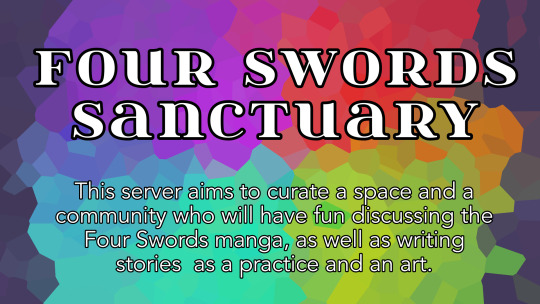
Four Swords Sanctuary writing discord server incoming! :D please read!
This server aims to curate a space and a community who will have fun discussing the Four Swords manga, as well as writing stories as a practice and an art.
Who will enjoy this server: anyone 16+ who enjoys FS manga meta, those who write or consume FS manga fan stories (of whatever format or genre that may be), or those who are familiar with the manga and would like to better their writing and storycraft through community.
Who will not enjoy this server: anyone 15 or younger (we love you, but this is not the place for you!), those who want a place to talk about general Zelda stuff or Linkverses, those unfamiliar and uninterested in becoming familiar with the FS manga, those that dislike shipping (Links and otherwise), or those not looking to connect with other creators or consumers.
If you still are interested, and would like to visit (or stay forever!), please click read more below!
If you have more questions, please click read more below!
Here is the Link (aha) to the server! I encourage you to spread this around, especially with people outside of Tumblr. It shouldn't ever expire.
(I'm being formal about the introduction and rules and stuff here but I do hope that this becomes a more casual, low-pressure place to talk!)


All rules and things are in there, but if you still have questions prior to joining, here is more information.
Please note that we allow and encourage:
All kinds of creators and creations: prose, poetry, art, comics, crafts, music, whatever your heart desires. There is a focus on writing prose fiction, though.
All ships (except minor/adult and incest ships—we do not consider shipping any of our characters as incest in canon)
NSFW and extreme content in the right channels
Critique, when asked for
Self promotion in relevant spots
Pet pictures
Talk about other Zelda games, particularly actually playing them
Casual off topic discussion (this is a focused community, but a community nonetheless)
We do not allow:
Anyone under 16, thank you for respecting that
A lot of LU/linkverse content (you can share off-topic things you make in your own channels though)
NSFW, whump, etc outside the appropriate channels, which are opt-in
If you have further concerns or questions, DM me here or on discord. :)
74 notes
·
View notes
Text
The cool thing about Marin is that she's a Disney princess with the stereotypical 'I Want To Leave This Place And See The World' song but she's doomed by the narrative to never ever be able to leave this place. Except the narrative was never doomed and she does leave this place. Girl made of themes I love her.
#Don't you dare die while playing Link's Awakening it's important thematically#Anyway this is the placeholder until such a time as I may write the Big Marin Meta#*slaps Marin's head* this bad boy can fit so many themes in her#My posts#Marin#Loz#link's awakening
11 notes
·
View notes